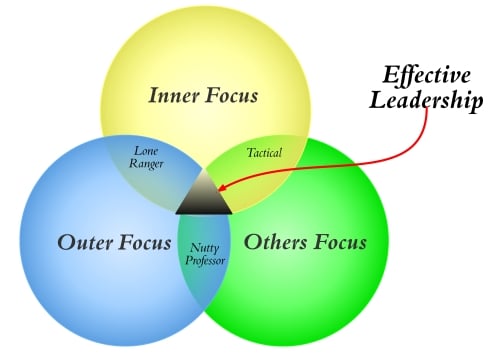Leaders Need 3 Kinds of Focus

Photo by Pedro Ribeiro Simões via Flickr
The ability to focus is a critical element for strong, effective leadership. Historically, we have thought of being focused as simply reducing distractions…concentration. Now, recent neuroscience research demonstrates it is more than simply concentrating. There are actually three distinct ways leaders are required to focus. Without all three of them you are limiting your ability to lead.
Daniel Goleman explained these three types of focus in a recent interview for the Harvard Business Review. Goleman describes how these three elements work together in defining how top executives and business owners get to the heart of effectively executing focus not only personally but across their companies.
Focus: Inner, Outer, and Others
Inner Focus: This is the most common form of focus. It allows you to block out other distractions, focus on what is at hand, and stay calm under pressure. It is the basis for intuition, trusting your gut, and good decision making. As a leader, inner focus allows you to stay focused on the goals you have set for yourself and for your company. Leaders who master this type of focus have few issues in following their own value system and managing their own schedule. If the average person was to define the word focus, they would more than likely be referencing this type of focus in their definition.
Focusing on Others: Sounds easy enough, but if you aren’t intentional about it, you will fail at this type of focus. Have you ever been in a meeting and lost interest in the discussion only to have it circle back to you and you are disconnected? I think everyone has at one time or another. You allowed your focus shift from others back to inner. To effectively focus on others, it’s all about empathy. You need to understand how another person thinks, how they feel, and with that be able to sense what you can do for that person. This is critical because empathy is the basis for all relationship skills: influence, team work, collaborations, inspiration, etc. As a leader, if you have employees you must be able to focus on others with an emphasis on how you can help them.
Outer Focus: This is being aware of larger forces that are affecting your business. Without this type of focus you cannot think strategically. Without this type of focus as a leader your business is a horse with blinders on. You aren’t paying attention to your surroundings. Economic conditions can change but you don’t make adjustments. Not having Outer Focus is a dangerous way to lead. Practicing Outer Focus is asking questions. It is systems and process awareness. It is looking at other products or services in the market place that on the surface may appear disconnected from your business, but on the broader scale have implications and opportunities that can impact it for either better or worse.
Want to get better at each focus?
Warning: For trailblazing Type- A business owners, some of these suggestions may sound hokie, but give it a go before you discount it!
How to improve your Inner Focus. (Practice mindfulness)
10 minutes/day (min): Conscientiously monitor what you are thinking about. Monitor your thoughts and feelings without getting reactive. Think about what you’re thinking about. You might be surprised how many places your mind goes in 10 short minutes. This strengthens the mental muscle for attention and inner focus.
How to improve your ability to Focus on Others. (Practice empathy)
Simply ask for feedback. You need to know if you understand what the person is saying, what they are feeling, or thinking. Not comfortable doing this with employees or clients? Practice with your spouse, your kids, a trusted friend or coach. Someone who you know will give you honest feedback and not just what you want hear.
How to improve your Outer Focus (The broader scope)
Find someone else who has abilities you admire. It may be an industry peer, a mentor, or a coach. But seek out someone who will want to help you get better. Someone who will challenge you to look at the bigger picture of your business and what you are really trying to accomplish with your business.
As a leader: How to help your team improve their focus
By demonstrating or applying any of the above examples you are effectively modeling to your peers, co-workers, and employees. So much of what we learn happens unconsciously modeling an action we see or hear. Think about how a child learns, they model what they see and hear. Don’t overcomplicate it, just do it.
Check out the entire HBR Interview: Daniel Goleman’s Three Kinds of Focus. What do you think? Do you do one better than the others? Which would you or your company benefit from the most by improving? As always we love to hear any thoughts or comments.
Chris Steinlage Kansas City Business Coach

